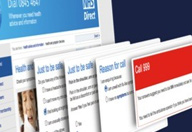Checked out
- 8 January 2010
Best use of ICT in patient and citizen involvement in healthcare
Winner:
NHS Direct, Digital Public
In 1997, the government announced that it was going to set up a 24-hour telephone advice line staffed by nurses.
NHS Direct – as it became known – was to provide “people at home with easier and faster advice and information about health, illness and the NHS, so that they are better able to care for themselves and their families.”
By 2000, the service had gone from being run out of regional call centres to being available nationwide. Fast forward to 2008; when NHS Direct decided to review its service offer with help from communication channel innovation specialists, Digital Public.
“Until then, NHS Direct had been predominantly phone based; yet people were increasingly visiting its website to seek health information and service delivery online,” says managing consultant Clare McKitrick.
“Our first challenge was therefore to establish a channel mix that reflected how people actually use the internet and the telephone to get health advice. We then needed to join those two operations up so they were seamless to consumers.”
Developing the symptom checkers
Digital Public began by helping NHS Direct build interactive symptom checkers that enable visitors to assess their own symptoms and seek out clinically proven advice on how best to treat them.
“We worked with NHS Direct’s clinicians and content developers to devise a clinically correct set of questions for website visitors to triage themselves online, and more importantly, ensure they ended up in the right queue in the call centre,” says McKitrick.
“NHS Direct had previously featured symptom checkers on its site, but none had an appropriate connection to its contact centre operations. If you went onto the site and discovered you needed to speak to a nurse, you had to call a number and go through the whole triaging process all over again.”
The new NHS symptom checkers ask enquirers about their symptoms and themselves and, on the basis of responses, provide self-care advice or refer visitors to a relevant healthcare provider. If more information is needed, they are offered a call-back or web chat with an advisor who is pre-appraised of their responses.
“Online symptom checkers enable people to participate in the triage process to standards already used by the NHS Direct contact centre,” says McKitrick. “By integrating the symptom checker with the contact centre systems, they get to speak to the right advisor first time.”
This posed some technical challenges. The underlying technology had to stand up to intense use and be able to handle the user journey throughout the whole decision tree system. It also had to be up to dealing with highly sensitive record storage and data management requirements, and to integrate with NHS Direct’s contact centre software.
The technology is also helping people to get advice anonymously through web chat, which McKitrick says is particularly important for engaging younger people and those with mental and sexual health conditions.
“It also helps NHS Direct target groups that its services wouldn’t normally reach, through syndication of the tools to other websites, like Netmums and Bebo,” she says.
Colds, contraceptives – and swine flu
NHS Direct and Digital Public used mock-ups of user journeys and prototypes to test the concept, scope, design and delivery of the symptom checker tools with patient and public involvement user groups. Their accessibility and usability were further tested by a panel of disabled users via Usability Exchange, a specialist in these areas.
Over 46,000 peopled viewed the pilot Emergency Contraception Zone or visited its profile page on Bebo, enabling Digital Public to test the multi-channel framework, demonstrate how it worked in practice, and show what changes were needed in NHS Direct’s practices.
The symptom checkers for Colds and Flu and Contraceptive Advice have recorded more than 4,000 unique visits each per week, with 86% of the users of the colds and flu tool claiming they would follow the advice and offering feedback on possible improvement.
However, online symptom checking has really proved its worth since the outbreak of swine flu, according to McKitrick. While calls to NHS Direct quickly escalated use of the online Cold and Flu symptom checker rose twentyfold to nearly 100,000 per week.
“Many of these users would otherwise have called the contact centre or visited other health providers, increasing pressure on GPs, A&E and other NHS public contact points. “By using the online tool, they were able to triage their symptoms and gain advice directly.”
Future plans
NHS Direct will deliver some 40 online symptom checkers by 2011, many of which will provide ongoing support for complications associated with long-term conditions.
“Our members were essential in providing feedback through focus groups and online surveys, helping us to ensure that these tools provide informative, easy-to-use health information and advice,” says NHS Direct Chief Executive, Nick Chapman.
“We should be proud of this achievement, which supports our ‘web first’ philosophy and shows that we continue to put patients at the heart of everything we do, even when providing contact remotely. This award recognises excellence in these areas,” he concludes.
Links:






